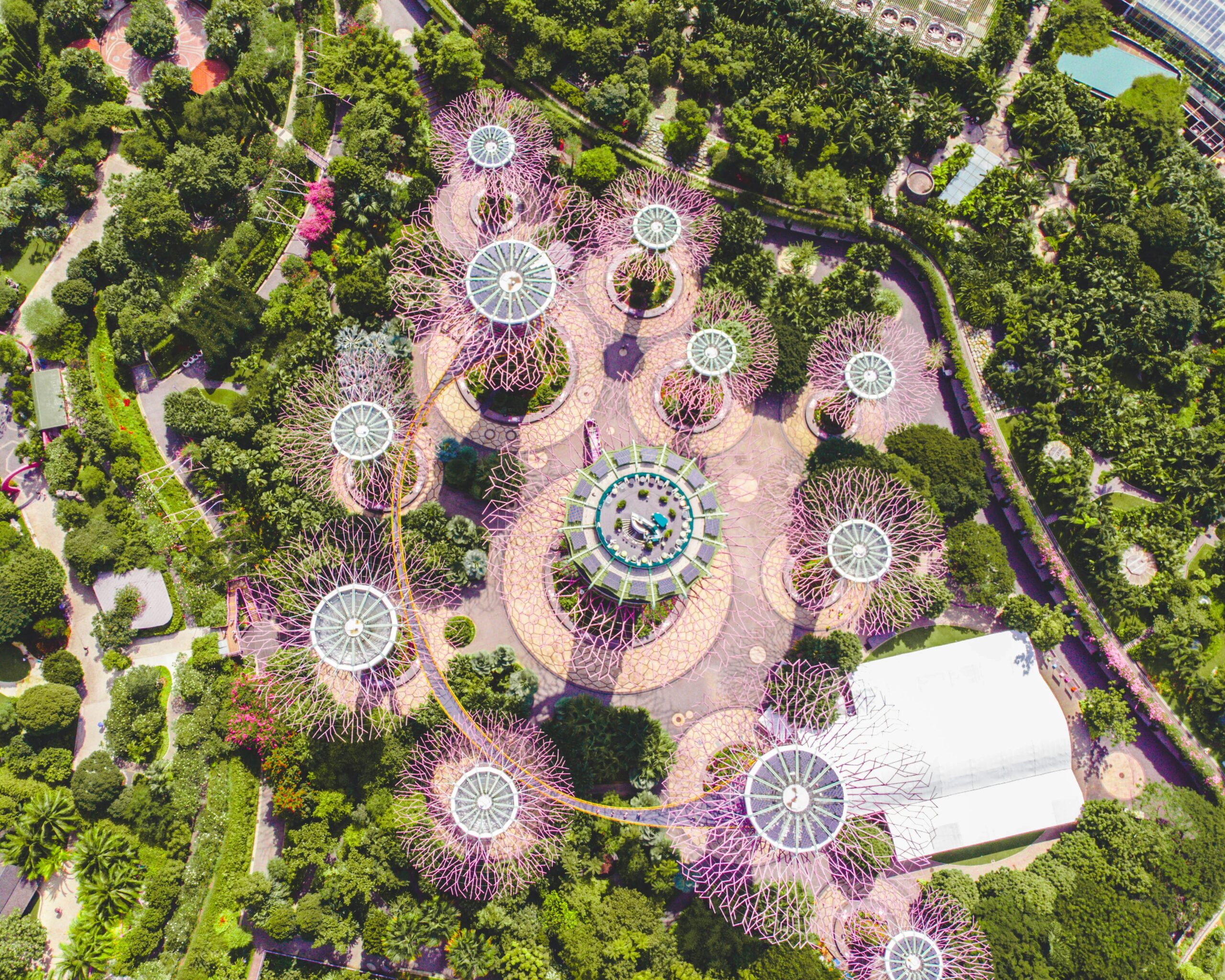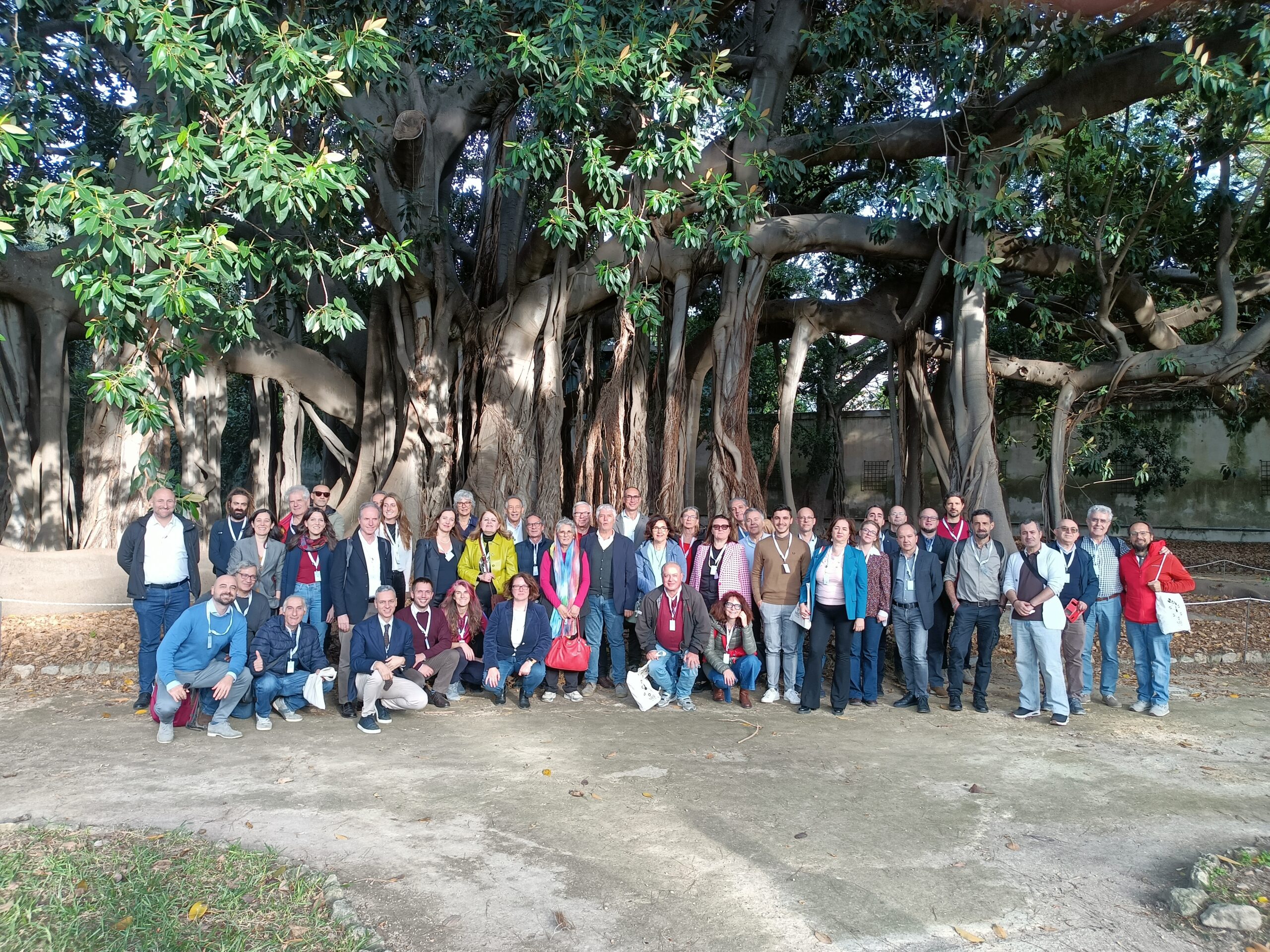The Director of the National Research Council (CNR), Carlo Calfapietra, gave a speech during the International Conference “THE FOREST CITY. Nature-based solutions for a sustainable future” regarding the importance of adopting approaches based on natural solutions for the restoration of ecosystems, in the creation of urban forests. These, in fact, distinguish themselves already in the planning phase from traditional reforestation activities and the creation of parks.
The International Conference was held during the days of May 29-30, in Rome, at the Auditorium Biblioteca Nazionale Viale Castro Pretorio, and drew attention to the use of urban and peri-urban forests in the fight against climate change.
Urban forests are a tangible example of the possible use of Nature-based Solutions. By integrating these solutions right from the design and construction phase of urban forests, the resulting ecosystems will be rich in biodiversity, capable of providing multiple vital ecosystem services, capable of improving social development and < strong> quality of life.
Conference Topics
The conference is inspired by the fact that the IUCN supported the proposal of the 3-30-300 formula proposed by the Nature-Based Solutions Institute:
– see at least 3 trees from your home;
– plan for 30 percent of the surface area of each neighborhood to be occupied by trees;
– achieve a park or green space within 300 metres.
The meeting, which was divided into 2 days alternating with symposiums and round tables, promotes urban and peri-urban forestation to tackle global warming, improve public health, and transform urban greenery into an essential element of city ecology and not only in an aesthetic element, through scientific practices and participatory processes.
Furthermore, there was an opportunity to illustrate the results of the PNRR Measurededicated to ‘Urban, Peri-urban and Extra-urban Forestry of the Metropolitan Cities of Italy’, which is based precisely on the reforestation of native tree and shrub species.
The program
29 May 2024
9.00 – 9.30 Arrival of the Authorities
9.30-10.00 Greeting from the Authorities
Moderator: Cristina Giannetti< /strong>, head of CREA press office
10.30-11.00 Opening of Scientific Works
Andrea Rispoli, Cufa Commander
Michele Talia, Inu President
Vincenzo Gesmundo, General Secretary of Coldiretti
Mauro Uniformi, President of the Council of the National Order of Agronomists and Forestry Doctors
Massimiliano Giansanti, President of Confagricoltura
Cristiano Fini, National President of CIA – Italian Farmers
11.00 – 12.00 Opening Conferences
Forests in the City: A New Approach for Urban and Human Regeneration
‘Urban Forests’ created by applying ‘Nature-based Solutions’ can contribute to both mitigation and adaptation to climate change and produce benefits for the health and quality of life of citizens. In addition to the positive effect on climate dynamics at a global level, there is a positive effect from the point of view of perceptions and behaviors.
The city thus becomes a place of experimentation and development in which highly natural green spaces, urban forests, take on a vital and strategic role in urban development policies.
Moderator: Riccardo Morri, Coordinator of the Doctorate in “Documentary, Geographical, Linguistic and Literary Sciences” “La Sapienza” University of Rome
Stefano Boeri, President “ Foundation for the Future of Cities”
Carlo Blasi, Director of the Scientific Council Interuniversity Research Center “Biodiversity, Ecosystem Services and Sustainability”
Matilda Van Den Bosch strong>, Senior Researcher at the Barcelona Institute of Global Health, Spain/European Forest Institute Biocities Facility
Urban Green Spaces as Nature-Based Solutions for People’s Health on a Healthy Planet
12.00 – 1.30pm First Symposium
Adaptation to the Climate Crisis, Protection of Biodiversity and Urban Planning
Urban and peri-urban forestation has now assumed a strategic value in urban development policies at a global level. this determines the need for a scientific and interdisciplinary approach that warns against the most common mistakes made in the past. The challenges imposed by climate change make it necessary to take a holistic and systemic approach towards urban forests which represent an effective and sustainable response to the evident transformation of the role of the city and its urban fabrics as the main place of hospitality for a large part of the world’s population.
Chair: Antonella Canini, Full Professor of Botany at the University of Rome Tor Vergata, President of the Italian Botanical Society
Antonio Scino, Chief of Staff of the Ministry of the Environment and Energy Security
Urban Reforestation and Green Protection. The Objectives of the Pnrr
Pedro Calaza, President of the Spanish Association of Public Parks and Gardens, Santiago De Compostela, Spain
Green Infrastructure, Compatible Urban Planning and Health em>
Lucina Caravaggi, Professor at the “La Sapienza” University of Rome
Thinking Rome Through the Woods< /p>
Maria Concetta Zoppi, Professor Emeritus of the University of Florence (Dida)
Ecological Urbanity: Complexity, Change, Responsibility em>
Lorenzo Ciccarese, Director of Research in Ispra and National Focal Point of IPBES
Multilateral Environmental Agreements Incentivize and Guide the Restoration of Urban Forests
Jerylee Wilkkes Allemann, Principal Scientist of the European Forest Institute – Biocities Facility
The Role of Trees and Urban Forests in Supporting the Transition towards Resilient Biocities, Healthy And Sustainable
1.30pm – 2.30pm Lunch
2.30pm – 4.30pm Second Symposium
Urban Forests and Citizen Wellbeing
Starting from the most recent evidence and estimates regarding the impact that global warming will have on cities in the coming decades (rising temperatures, exposure to extreme meteorological events), the benefits of urban and peri-urban forestation both for the climate and for the psychophysical well-being of the inhabitants. The extreme effects of climate change have very high social costs and urban forests can become an extremely effective response to this problem.
Green spaces reduce urban heat islands, positively influence physical and mental health, contribute to adaptation to extreme heat, protect biodiversity, reduce air pollution, mitigate the effects of extreme weather events and contribute to the definition of sustainable social and economic development.
Chair: Dario Manfellotto, President of the Fadoi Foundation
Marino Bonaiuto, Professor at the “La Sapienza” University of Rome
The Psychological-Social Impacts of Green Areas and Urban Forests
Gemma Calamandrei/Francesca Cirulli, Istituto Superiore di Sanità
Nature-based solutions for mental health: urban forests for promotion and recovery strong>
Francesco Dentali, President of Fadoi
Fadoi/Carabinieri Project “A Tree for Health”
Pier Mannuccio Mannucci, Professor Emeritus of Internal Medicine at the Milan Polyclinic
Green, Pollution and Health
Girolamo Sirchia, Professor and Former Minister of Health
Parks in the City Protect Health
Isabella Annesi-Maesano, Deputy Director, Desbrest Institute of Epidemiology
Climate Change, Biodiversity and the “Urban Name”< /p>
Federica Zabini, Researcher at the Bioeconomy Institute, Cnr-Ibe
Evidence-based Forest Therapy: A Point of Reference for Urban Forestry Initiatives For Health and Wellbeing
4.30pm – 6.30pm Round Table
From the Pnrr to the National Network of Urban Forests
The calls to progressively extend the areas designated for urban and peri-urban greenery are increasingly multiplying, even in Italy. The 2018 national urban green strategy establishes that the surfaces dedicated to urban greenery should be increased through the preliminary elimination of asphalt and the subsequent planting of new woods consistent with the potential natural vegetation in order to create ‘islands of naturalness’ and mitigate the effects of the climate crisis.
These objectives, necessary and inalienable, have been taken up by the European strategy for biodiversity, by the European strategy for forests and by the objectives of the biodiversity conference (cop 15).
Moderator: Carlo Blasi, Director of the Scientific Council of the Interuniversity Research Center “Biodiversity, Ecosystem Services and Sustainability”
Greetings from Lucia Leonessi, General Director of Confindustria Cisambiente
Massimo Labra, Professor of the University of Milan Bicocca
General Director of Naturalistic Heritage and the Sea
Giorgio Centurelli, General Director of Pnrr, Ministry of environment and energy security
Isabella Ligia, Head of the Strategic Planning, Vas and Pnrr Service of the Metropolitan City of Cagliari Franco Maria Raimondo, Planta/Autonomous Center for Research, Documentation and Training of Palermo< br />Gabriele Bovo, Metropolitan City of Turin
Stefano Carta, Director of the Pnrr Department of the Metropolitan City of Rome
Laura Papaleo , Head of Europe Office – Head of Management, Monitoring and Reporting Unit of Pnrr/Pnc Projects – Metropolitan City of Genoa
Silvia Biondini, National Carabinieri Biodiversity Center of Pieve Santo Stefano
Gabriele Guidolotti, Confindustria Cisambiente
30 May 2024
9.00 – 10.00 Opening Conferences
Trees, Forests and Cities: A Thousand-Year History
When observing our cities, trees certainly measure the quality of man’s relationship with nature in a plastic and evident way. the tree, a central element of the forest, a significant and loved presence, is also threatened by vandalism and neglect. It assumes rights and deserves defense by the citizens. Man has linked much of his history and his economic and cultural development to forests, a central element for the construction of entire civilizations. gardens, vegetable gardens, trees or small forest areas accompanied the development of our cities, clearly and evidently reflecting the level of civilization that those men had achieved. Analyzing and understanding the development of the relationship between man and the forest can become a central element for rethinking the role that forests can have today in building resilient cities.
Moderator: Pierluigi Sassi, President of Earth Day Italia
Giulia Caneva, Full Professor of the University of Roma Tre
Trees and Forests in the Imagination of the Ancients< /p>
Paolo Grossoni, Professor Emeritus of the University of Florence (Dagri)
Botanical Gardens and Historic Gardens as Possible Sink in Strategies for the Conservation of Urban Green Space
Robert Lavalva, Principal Greensward Advisors
The Market The Forest And The City
10.00 – 13.00 Third Symposium
Urban Forests: Nature-Based Solutions And Ecosystem Services
The creation of an urban forest is certainly a complex and delicate operation which, already in the design phase, must be able to differentiate itself both from classic reforestation activities and from the creation of urban parks or public trees. Urban forests must be rich in biodiversity, preferably in connection with each other and with peri-urban natural areas. The use of native species (trees, shrubs and herbaceous) makes the new forest structures ecologically functional, autonomous and resilient. The ecosystem services that urban forests created in this way will be able to provide will certainly be able to support social development and human well-being in the city of the future.
Chair: Davide De Laurentis, CUFA
Paola Mercogliano, Principal Scientist of the Euro-Mediterranean Center on Climate Change
Climate Change: The Problem and the Solutions< /p>
Andrea Romero Montoya and Christophe Besacier, FAO Consultants
Orientation and Capacity Strengthening for Effective Ecosystem Restoration Over the Decade and Beyond
Carlo Calfapietra, Director of the National Research Council (Cnr)
Approaches Based on Natural Solutions for the Restoration of Ecosystems
Davies Clive, President of the European Forum on Urban Forestry, Consultant to the European Forestry Institute
Urban Forests as a Natural Solution em>
Francesco Ferrini, Professor at the University of Florence (Dagri)
Maximizing the Benefits of Urban Forests by Improving Biodiversity and Ecosystem Services
Joachim Maes, European Commission, Directorate for Regional and Urban Policies
Greening European Cities: How Nature in the City Supports the Green Transition< /strong>
Fausto Manes, Full Professor at the “La Sapienza” University of Rome
Ecosystem Regulatory Services in Urban Areas< /p>
Francesco Petretti, Professor at the University of Perugia
Urban Forests and Conservation of Biodiversity
Gianluca Piovesan/Giovanni Quilghini/Raffaele Manicone, University of Tuscia (VT)/ CUFA
Recovery and Renaturalization of Coastal Dune Ecosystems in Response to Global Changes : The Case of Duna Feniglia
Vicente Guallart, Urbanist Architect, Founder of the Institute For Advanced Architecture of Catalonia, Spain Cities That Follow the Rules of Nature
1.00pm – 2.00pm Lunch
2.00pm – 4.00pm Fourth Symposium
Public and Private in Support of Urban Forests
Urban forests have been defined as the “backbone” of cities’ green infrastructure and represent the connection between rural areas and urban areas that drastically improves their environmental footprint. It is therefore necessary that the various political forums responsible for identifying the most effective strategies for mitigating the effects of climate change are open to discussions with non-governmental, social and business organizations to jointly address the particularly complex challenges that these issues are posing with growing urgency.
Chair: Piermaria Corona, Director of the Forestry and Wood Center – Crea
Simone Borelli, Head of Urban Forestry and Coordinator of the FAO Green Cities Initiative
The Role of Urban Forests in a Changing Climate
Sacha M. De Giovanni, Teacher, Geographer and Environmentalist of the Italian Geography Teachers Association (A.I.I.G.)
School Gardens as an Element of Discontinuity at Scale Subway
Nada Forbici, President Assofloro Coordinator of the Coldiretti Florovivaismo National Council
Analysis of the relaunch of the Italian forestry nursery by the entrepreneurial system: models, synergies and critical issues strong>
Marco Marchetti, President of the Alberitalia Ets Foundation
From the Cities to the Forest
Gabriel Paes Da Silva Sales, Professor at the Department of Biology of the Pontifical Catholic University of Rio De Janeiro
The Story Told Through Trees: Forest Conservation In the City of Rio De Janeiro, Brazil, in Times of Climate Emergency
Eduardo Pinheiro, Manager of Natural Protected Areas, State Institute for the Environment, Rio De Janeiro, Brazil
Challenges and Opportunities in the Management of Urban Protected Areas A Rio De Janeiro, Brazil
Fabio Salbitano, Professor of Silviculture, Urban Forestry and Urban Arboreal Systems at the University of Sassari and Scientific Coordinator of the Alberitalia Foundation
A Tree on Your Doorstep , A Forest in the Heart: Strategies, Governance and Participation for Urban Forests of Biocities
Alessandra Stefani, General Director, Mountain and Forestry Economy of the Ministry of Agriculture, Food Sovereignty and Forestry
The National Nursery System at the Service of Activities Of Reforestation And Urban Forestry In The Light Of Legislative Decree 34 Of 2018 And Its Implementing Decrees
16.00-18.00 Round Table
Sowing knowledge and awareness together. Urban Forests Regenerated Space
Expanding the space for trees in cities, replacing asphalt with livable and healthy spaces, also means expanding the space that nature occupies in minds and hearts .
Education on legality, environmental education and urban environmental education (a little-explored and little-practised terrain) represent a change in paradigm and behaviour, which can exert a positive influence on other forms of relationship with nature, such as outdoor education, sustainable tourism and ecotourism. Attention to the environment and knowledge of natural ecosystems necessarily leads to a new awareness of the need to conserve nature at a local and global level.
Moderator: Mario Salomone, Secretary General of Weec Network
Sean Southey, Director of the Education and Communication Commission, Iucn
Maria Chiara Pastore , Researcher at the Polytechnic of Milan
Andrea Cassone, President of Aiapp
Giorgio Raffetto, Secretary of the Capellino Foundation
Aurelio Angelini, President of the National Committee for Sustainability Education Agenda 2030
Dario Padovan, Professor of the University of Turin, UNESCO Chair
Paolo Orefice , Director of the UNESCO Transdisciplinary Chair in Human Development and Culture of Peace, Professor Emeritus of the University of Florence
Giuseppe Milano, Journalist and Secretary of Greenaccord< /p>
18.00 – 18.30 Conclusions
Carlo Blasi Raffaele Manicone Andrea Rispol
6.45pm Greeting Aperitif
The event is valid as recognition of Cfp-Professional Training Credits for members of the National College of Agrotechnicians and Graduated Agrotechnicians
The training accreditation of the event is also confirmed, which will be uploaded onto the Sidaf platform and included in the National Catalog for the granting of training credits for agronomists and forestry doctors
The event was included on the Sigef platform for the achievement of training credits for journalists.
Photographic Exhibition
Green Cities
Four Photographers Interpret The Relationship Between Trees And The City: Roberto Besana (Man, The Environment And The Tree) , Fulvio Bortolozzo (The Tree And The City), Luca Chistè (Trees In The City) and Luca Massari (The City Parks). The images are linked to four themes of “The Forest City”: Health and Quality of Life (One Health), Urban and Peri-urban Forestry; From Urban Greenery as “Furniture” of the City to an Essential Component of Urban Ecology; Raise awareness of respect for trees, promote the use of outdoor education and attention to biodiversity. The exhibition, in collaboration with Weec Network, is curated by Roberto Besana.
Download the program«I think every city should have a park,
or rather a primitive forest, of five hundred or a thousand acres, in a block or several areas, where a branch is never cut for fuel, not for building ships , not to make carts, but to stand and decompose for higher uses – a common possession for education and recreation”(Henry David Thoreau, Diary – October 15, 1859)



 Italiano
Italiano





